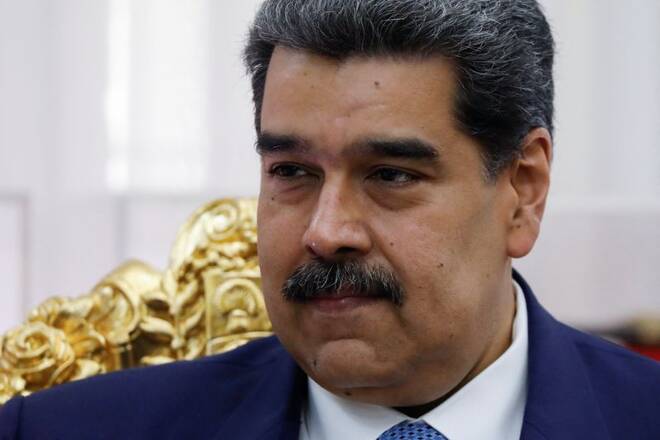Advertisement
Advertisement
London’s High Court rules against Venezuela’s Maduro in $1 billion gold battle
By:
LONDON (Reuters) - Britain's High Court rejected Nicolas Maduro's latest efforts on Friday to get control of more than $1 billion of Venezuela's gold reserves stored in the Bank of England's underground vaults in London.
By Marc Jones
LONDON (Reuters) – London’s High Court has rejected President Nicolas Maduro’s latest efforts to gain control of more than $1 billion of Venezuela’s gold reserves stored in the Bank of England’s underground vaults in London.
The court ruled on Friday that previous decisions by the Maduro-backed Venezuelan Supreme Court, aimed at reducing opposition leader Juan Guaido’s say over the gold, should be disregarded.
It marked the latest victory for Guaido, who has won a series of legal clashes over the bullion after the British government recognised him rather than Maduro as the South American country’s president.
“I have … concluded that the Guaido Board succeeds: that the STJ (Venezuelan supreme court) judgements are not capable of being recognised,” the judge in the case said.
The Maduro and Guaido camps have each appointed a different board to the Central Bank of Venezuela (BCV) and the two have issued conflicting instructions concerning the gold reserves.
Lawyers for the Maduro-backed BCV board said the central bank was considering an appeal after Friday’s ruling, while Guiado, who has seen some international support falter over the last 18 months, called it an important victory.
The Maduro-backed BCV board said in a statement it rejected the court’s ruling and reserved “all legal action at its disposal to appeal this unusual and disastrous” decision.
Shortly after, the vice president and finance minister Delcy Rodriguez said on state television that “the damage caused to our people is serious” and that the court “has to rectify.”
Maduro’s legal team has said he would like to sell some of the 31 tonnes of gold to finance Venezuela’s response to the pandemic and bolster a health system gutted by years of economic crisis.
Guaido’s opposition has alleged that Maduro’s cash-strapped administration wants to use the money to pay off his foreign allies, which his lawyers deny.
“This decision represents another step in the process of protecting Venezuela’s international gold reserves and preserving them for the Venezuelan people,” Guaido said in a statement.
“This type of honest and transparent judicial process does not exist in Venezuela.”
The British government in early 2019 joined dozens of nations in backing Guaido, after he declared an interim presidency and denounced Maduro for rigging 2018 elections.
Guaido at that time asked the Bank of England to prevent Maduro’s government from accessing the gold. Maduro’s central bank then sued the Bank of England to recover control, saying it was depriving the BCV of funds needed to finance Venezuela’s coronavirus response.
Legal experts have said the latest case has been unprecedented as it has seen one of a country’s highest courts interpreting the constitution of another.
“This is an unfortunate ruling,” said Sarosh Zaiwalla at Zaiwalla & Co, which represented the Maduro-backed central bank, adding it would continue to pursue the case despite Friday’s decision.
“The BCV remains concerned that the cumulative effect of the judgments of the English Court appears to accord a simple statement by the UK Government recognising as a head of state a person with no effective control or power over any part of that state,” Zaiwalla added.
(Reporting by Marc Jones; Editing by Michael Holden, Catherine Evans, Barbara Lewis and Daniel Wallis)
About the Author
Reuterscontributor
Reuters, the news and media division of Thomson Reuters, is the world’s largest international multimedia news provider reaching more than one billion people every day. Reuters provides trusted business, financial, national, and international news to professionals via Thomson Reuters desktops, the world's media organizations, and directly to consumers at Reuters.com and via Reuters TV. Learn more about Thomson Reuters products:
Advertisement
